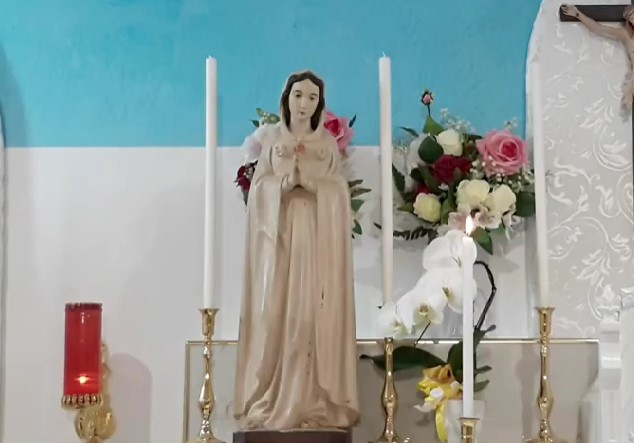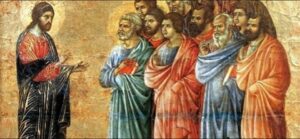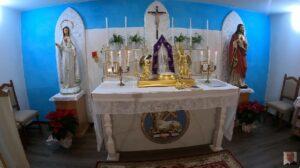
Which of these three, in your opinion, proved himself neighbor to him who fell among the robbers? And he said, He who took pity on him. And Jesus said to him, Go and do also in like manner.
ORARI S.MESSA DI GIOVEDI 1 SETTEMBRE 2022, ORE 18.00:
Feria Quinta infra Hebdomadam XII post Octavam Pentecostes IV. Augusti ~ IV. classis
Commemoratio: S. Ægidii Abbatis
S.MESSA ONLINE DI DON ENRICO RONCAGLIA, su youtube channel:
https://www.youtube.com/channel/UCYYDj4O4e11cE7XNtngkoJA
e qui:
LITURGIA IN LATINO\ENGLISH:
https://divinumofficium.com/cgi-bin/missa/missa.pl
COMMUNIO PREGHIERE\PRAYERS:
https://www.proselitismodellascienza.it/2021/10/25/communio-e-comunione-spirituale/
EVANGELIUM E OMELIA\HOMILY:
Luc 10:23-37
In illo témpore: Dixit Iesus discípulis suis: Beáti óculi, qui vident quæ vos videtis. Dico enim vobis, quod multi prophétæ et reges voluérunt vidére quæ vos videtis, et non vidérunt: et audire quæ audítis, et non audiérunt. Et ecce, quidam legisperítus surréxit, tentans illum, et dicens: Magister, quid faciéndo vitam ætérnam possidébo? At ille dixit ad eum: In lege quid scriptum est? quómodo legis? Ille respóndens, dixit: Díliges Dóminum, Deum tuum, ex toto corde tuo, et ex tota ánima tua, et ex ómnibus víribus tuis; et ex omni mente tua: et próximum tuum sicut teípsum. Dixítque illi: Recte respondísti: hoc fac, et vives. Ille autem volens iustificáre seípsum, dixit ad Iesum: Et quis est meus próximus? Suscípiens autem Iesus, dixit: Homo quidam descendébat ab Ierúsalem in Iéricho, et íncidit in latrónes, qui étiam despoliavérunt eum: et plagis impósitis abiérunt, semivívo relícto. Accidit autem, ut sacerdos quidam descénderet eádem via: et viso illo præterívit. Simíliter et levíta, cum esset secus locum et vidéret eum, pertránsiit. Samaritánus autem quidam iter fáciens, venit secus eum: et videns eum, misericórdia motus est. Et apprópians, alligávit vulnera eius, infúndens óleum et vinum: et impónens illum in iuméntum suum, duxit in stábulum, et curam eius egit. Et áltera die prótulit duos denários et dedit stabulário, et ait: Curam illíus habe: et quodcúmque supererogáveris, ego cum redíero, reddam tibi. Quis horum trium vidétur tibi próximus fuísse illi, qui íncidit in latrónes? At ille dixit: Qui fecit misericórdiam in illum. Et ait illi Iesus: Vade, et tu fac simíliter.
Gospel
Luke 10:23-37
At that time, Jesus said to His disciples: Blessed are the eyes that see what you see! For I say to you, many prophets and kings have desired to see what you see, and they have not seen it; and to hear what you hear, and they have not heard it. And behold, a certain lawyer got up to test Him, saying, Master, what must I do to gain eternal life? But He said to him, What is written in the Law? How do you read? He answered and said, You shall love the Lord your God with your whole heart, and with your whole soul, and with your whole strength, and with your whole mind; and your neighbor as yourself. And He said to him, You have answered rightly; do this and you shall live. But he, wishing to justify himself, said to Jesus, And who is my neighbor? Jesus answered and said, A certain man was going down from Jerusalem to Jericho, and he fell in with robbers, who after both stripping him and beating him went their way, leaving him half-dead. But, as it happened, a certain priest was going down the same way; and when he saw him, he passed by. And likewise a Levite also, when he was near the place and saw him, passed by. But a certain Samaritan as he journeyed came upon him, and seeing him, was moved with compassion. And he went up to him and bound up his wounds, pouring on oil and wine. And setting him on his own beast, he brought him to an inn and took care of him. And the next day he took out two denarii and gave them to the innkeeper and said, ‘Take care of him; and whatever more you spend, I, on my way back, will repay you.’ Which of these three, in your opinion, proved himself neighbor to him who fell among the robbers? And he said, He who took pity on him. And Jesus said to him, Go and do also in like manner.
DALL’OMELIA DI (FROM THE HOMILY BY) DON ENRICO RONCAGLIA – GIOVEDI 1 SETTEMBRE 2022, ORE 18.00:

DALL’OMELIA DI DON ENRICO RONCAGLIA (*,1)
Oggi celebriamo la festa di Sant’ Egidio è stato un eremita di un monastero nel sud della Francia; è venerato come santo dalla Chiesa cattolica. E’ stato molto popolare in passato (nel medioevo, VII secolo). Rimane popolare nella Francia meridionale. Vicino a Nimes costrui’ un eremo che divenne poi una grande abbazia e santuario (Saint Gilles).
Sant’Egidio ci insegna che la santita’ puo’ lasciare una scia di bene anche per molto tempo.
Facciamo in modo di diventare anche noi sorgenti di santita’!
Sia lodato Gesu’ Cristo! Sempre sia lodato!
____________________
(*) Questo commento e’ scritto in tempo reale durante l’omelia. Mi scuso per l’eventuale misinterpretazione delle parole di Don Enrico.
(1) La Cappella dei Sacri Cuori e’ d’ora in avanti sotto la protezione della Madonna Pellegrina di Montichiari (Brescia, 1946).
FROM THE HOMILY BY DON ENRICO RONCAGLIA (**,1)
Today we celebrate the feast of Saint Egidio was a hermit of a monastery in the south of France; he is revered as a saint by the Catholic Church.
He was very popular in the past (in the Middle Ages, 7th century).
It remains popular in southern France. Near Nimes he built a hermitage which later became a large abbey and sanctuary (Saint Gilles).
Sant’Egidio teaches us that holiness can leave a trail of good even for a long time.
Let us make sure that we too become sources of holiness!
Praised be Jesus Christ! Always be praised!
____________________
(*) This comment is written in real time during the homily. I apologize for any misinterpretation of Don Enrico’s words.
(1) The Chapel of the Sacred Hearts is from now on under the protection of the Pilgrim Madonna of Montichiari (Brescia, 1946).

